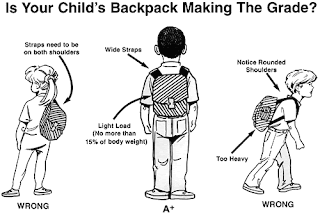Backpacks come in all sizes, colors, fabrics, and shapes and help kids of all ages express their own personal sense of style. And when used properly, they're incredibly handy. However backpacks that are too heavy or are worn incorrectly can cause problems for children/teenagers. Improperly used backpacks may injure muscles and joints. This can lead to severe back, neck, and shoulder pain, as well as posture problems.
To help understand how heavy backpacks can affect a kid's body, it helps to understand how the back works. The spine is made of 33 bones called vertebrae, and between the vertebrae are discs that act as natural shock absorbers.
When a heavy weight, such as a backpack filled with books, is incorrectly placed on the shoulders, the weight's force can pull a child backward. To compensate, a child may bend forward at the hips or arch the back, which can cause the spine to compress unnaturally. The heavy weight might cause some kids to develop shoulder, neck, and back pain.
Kids who wear their backpacks over just one shoulder — as many do, because they think it looks better — may end up leaning to one side to offset the extra weight. They might develop lower and upper back pain and strain their shoulders and neck.
Also, backpacks with tight, narrow straps that dig into the shoulders can interfere with circulation and nerves. These types of straps can contribute to tingling, numbness, and weakness in the arms and hands.
Despite their potential problems, backpacks are an excellent tool for kids when used properly.
Look for the following before you buy that trendy new backpack your kid or teen
- Wide, padded shoulder straps – Narrow straps can dig into shoulders. This can cause pain and restrict circulation.
Two shoulder straps – Backpacks with one shoulder strap that runs across the body cannot distribute weight evenly
Padded back – A padded back protects against sharp edges on objects inside the pack and increases comfort.
Waist strap – A waist strap can distribute the weight of a heavy load more evenly
Lightweight backpack – The backpack itself should not add much weight to the load
To prevent injury when using a backpack, do the following:
Always use both shoulder straps. Slinging a backpack over one shoulder can strain
muscles. Wearing a backpack on one shoulder may increase curvature of the spine
Tighten the straps so that the pack is close to the body. The straps should hold the pack
two inches above the waist.
Pack light. The backpack should never weigh more than 10 to 15 percent of the student's total body weight. (For example, the backpack of a child who weighs 40Kilo Grams shouldn’t weigh more than 4Kg to 6Kg).
Organize the backpack to use all of its compartments. Pack heavier items closest to the center of the back.
Bend using both knees, when you bend down. Do not bend over at the waist when wearing or lifting a heavy backpack.
Learn back-strengthening exercises to build up the muscles used to carry a backpack
You may need to adjust backpacks and/or reduce how much you carry if you:
struggle to get the backpack on or off
have back pain
lean forward to carry the backpack
If you have back pain or numbness or weakness in the arms or legs, talk to your doctor.

